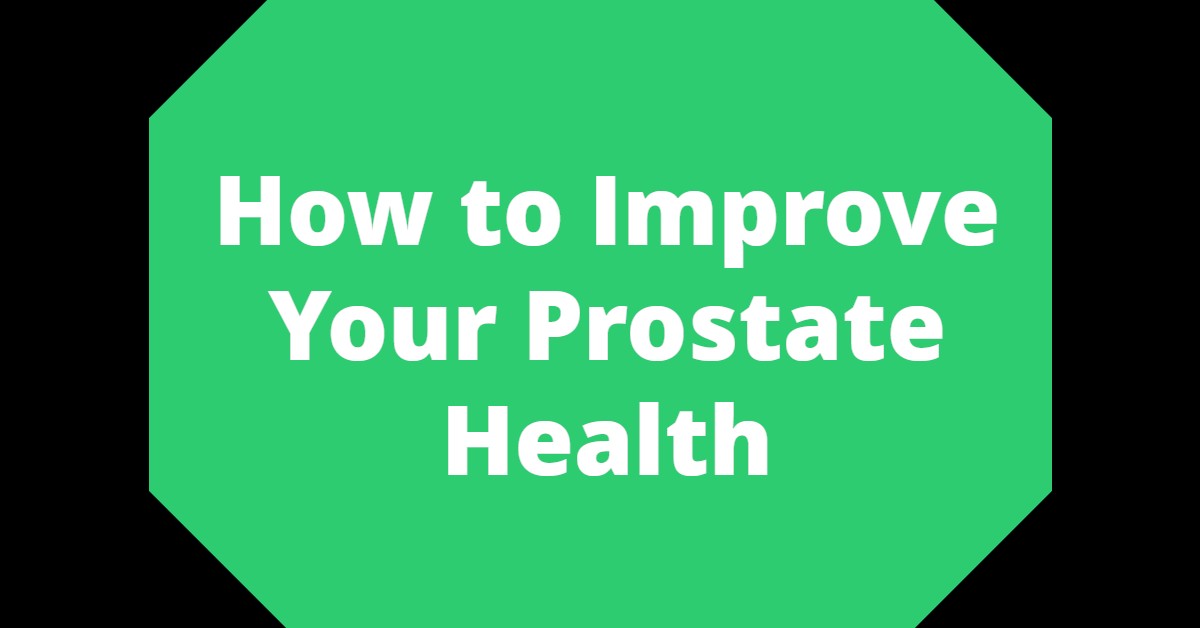How to Improve Your Prostate Health (11 Top Tips)

How to Improve Your Prostate Health: Prostate health refers to the overall health and function of the prostate gland, which is a small gland located between the bladder and the penis in males. The prostate gland produces a fluid that is an essential component of semen, and it also plays a role in controlling urine flow.

Maintaining good prostate health is important for men of all ages.
The prostate gland can be affected by various conditions, including prostate cancer, benign prostatic hyperplasia (BPH), prostatitis (inflammation of the prostate), and urinary incontinence.
How to Improve Your Prostate Health: FAQs & Answers
Are there any supplements that can improve prostate health?
Some natural supplements, such as saw palmetto and beta-sitosterol, have been suggested to have potential benefits for prostate health. However, more research is needed to confirm their effectiveness. Talk to your healthcare provider before taking any supplements.
How often should I get a prostate exam?
The frequency of prostate exams depends on your age and risk factors. Your healthcare provider can recommend a schedule that is appropriate for you.
How can I reduce my risk of prostate cancer?
Some ways to reduce the risk of prostate cancer include maintaining a healthy weight, eating a healthy diet, staying physically active, avoiding smoking and excessive alcohol consumption, and getting regular prostate exams and screenings.
11 Tips on How to Improve Prostate Health
The prostate is both an accessory gland of the male reproductive system and a muscle-driven mechanical switch between urination and ejaculation.
Here are tips on how to improve your prostate health:
1. Maintain a healthy diet
A healthy diet that includes fruits, vegetables, whole grains, and lean proteins is important for overall health, including prostate health. Some studies have suggested that a diet rich in fruits and vegetables may reduce the risk of prostate cancer. Other foods that may be beneficial for prostate health include fish, nuts, and seeds. On the other hand, a diet high in red meat and dairy products may increase the risk of prostate cancer.
2. Stay physically active
Regular exercise has been shown to reduce the risk of various health problems, including prostate problems. Exercise can help maintain a healthy weight, which is also important for prostate health. Aim for at least 30 minutes of moderate physical activity most days of the week.
3. Reduce your red meat intake
Heavy red meat intake has been linked to PhIP, a chemical produced when red meat is burned that raises the chance of prostate cancer. You can lower your risk by limiting your consumption of red meat to rare events.
4. Maintain a healthy weight
Being overweight or obese has been linked to an increased risk of prostate cancer and other health problems. Losing weight and maintaining a healthy weight can help reduce this risk. If you are overweight, aim to lose weight gradually by making small changes to your diet and increasing physical activity.
Must Read: What is Intuitive Eating? (10 Benefits to Your Well-being)
5. Avoid smoking and excessive alcohol consumption
Smoking and excessive alcohol consumption have been linked to an increased risk of prostate cancer and other health problems. If you smoke, quit. If you drink alcohol, do so in moderation.
6. Get regular prostate exams and screenings
Regular prostate exams and screenings can help detect prostate problems early when they are most treatable. Depending on your age and risk factors, your healthcare provider may recommend a prostate-specific antigen (PSA) test and/or a digital rectal exam (DRE).
7. Manage stress
Stress can have a negative impact on prostate health. Practice stress-management techniques, such as meditation, deep breathing, or yoga, to help reduce stress levels.
8. Stay hydrated
Drinking plenty of fluids can help flush toxins out of the body, which can be beneficial for prostate health. Aim to drink at least eight glasses of water a day.
9. Consider natural supplements
Some natural supplements, such as saw palmetto and beta-sitosterol, have been suggested to have potential benefits for prostate health. However, more research is needed to confirm their effectiveness. Talk to your healthcare provider before taking any supplements.
10. Practice safe sex
Sexually transmitted infections (STIs) can increase the risk of prostate problems. Use condoms or practice other safe sex measures to reduce the risk of STIs.
11. Talk to your healthcare provider
If you have concerns about your prostate health, talk to your healthcare provider. They can provide information and guidance on how to maintain good prostate health and reduce your risk of prostate problems.
Conclusion
In conclusion, prostate health refers to the overall health and function of the prostate gland, which is a small gland located between the bladder and the penis in males. The prostate gland produces a fluid that is an essential component of semen, and it also plays a role in controlling urine flow.
To improve prostate health, it’s important to maintain a healthy lifestyle. Some natural supplements may also be beneficial, but it’s important to talk to your healthcare provider before taking any supplements. But you must maintain a healthy diet. A healthy diet that includes fruits, vegetables, whole grains, and lean proteins is important for overall health, including prostate health.
By following these tips, you can reduce your risk of prostate problems and improve your overall prostate health.
Don’t forget to share this information with others. Thank you.
Recommended:
Check out the following related articles.
Top Healthy Foods To Eat Everyday (2023 Guide)




